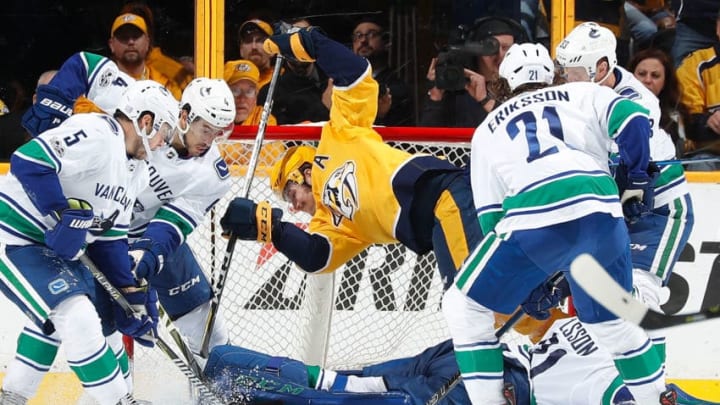The Vancouver Canucks took advantage of repeated defensive mistakes by the Nashville Predators. A rare lowlight closed out the home team’s superb November.
Before I get into the nitty gritty of the Nashville Predators’ loss last night, take a look at the game flow:
There are a few key differences between last night’s game and many others this season. Primarily, the Predators actually controlled possession throughout most of the game. Often, Nashville seems to win in spite of lower shot production than opponents.
Of course, there are several similarities as well. First of all, the second period belonged to Nashville, with a +1 goal differential. Before the game, the Predators’ average second-period goal differential was +0.77 since November 1st. The second similarity is the latter half of the third period. The close score somewhat disguised the usual third-period collapse. Rest assured, though, collapse the Predators did.
Because Nashville is winning so many games, it’s hard to criticize the issue too much. Last night is an example, though, of how a failure to close games can really hurt this team. Imagine the pressure players will face if they drop a few consecutive games because of horrendous third periods. I’d like them to anticipate that possibility and make the necessary adjustments ahead of time. Maybe, just maybe, a surprising home loss will be the wake-up call they need.
Second Period Woes
Although the Nashville Predators escaped the second period with a one-goal advantage, Vancouver was actually the better team. For this angle, I’m using score-adjusted (SA) five-on-five percentages. Adjusting for score describes possession trends more accurately, by assuming that a losing team will play more offensively. In other words, focusing more on generating shots than suppressing opponents. You can (and I encourage you to) read more about the specific formulation here.
If you ask me, the Predators lost this game in the scoreless first period. Here’s why:

Throughout the first period, the Predators had a huge possession advantage. They generated the vast majority of shot attempts, scoring chances, and high-danger chances. Certainly, Anders Nilsson bailed the Canucks out. Although it was still very early in the game, I’d like to see offensive leaders like Ryan Johansen, Craig Smith, or Filip Forsberg recognize the early possession advantage and heavily pressure the zone. Based on who was generating offense, Nashville should have taken a two- or even three-goal advantage into the first intermission.
The second period, again, score withholding, belonged to Vancouver. The Nashville Predators failed to maintain the excellent pressure they created in the first period. If not for a timely power-play goal from Forsberg, Nashville could have been buried in the second.
The third period saw a return to form by the Predators in some areas. Their shot attempts and scoring chances outnumbered Vancouver’s. However, the Canucks retained the advantage in high-danger chances. As we all know by now, high-danger chances are often the primary factor in determining a game’s outcome. When the slot protection falls apart in the final period, it’s not surprising that the opponent takes and keeps the lead.
Play for sixty
Without question, it’s excusable to lose a home game occasionally. The Nashville Predators have been dominant lately, so it’s not fair to be overly upset by one performance. The sticking point for me is repeated mistakes. Nashville had so many chances to put this game away early, but allowed Vancouver to stay close.
Next: Five Thoughts For Friday, Dec 1st
If the Predators hope to remain among the best in a brutal Central Division, they need to tighten some screws. Until then, join me in hoping the league gets rid of third periods altogether.
